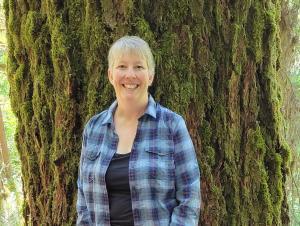
Melissa Lucash
Education
Ph.D. SUNY College of Environmental Science and Forestry, Syracuse, NY
M.S. Oregon State University, Corvallis, OR
B.S. SUNY College of Environmental Science and Forestry, Syracuse, NY
Publications
Recent Publications (in the last five years)
Sanders-DeMott, R, LR Hutyra, MD Hurteau, WS Keeton, KS Fallon, WRL Anderegg, DY Hollinger, SE Kuebbing, MS Lucash, E. M. Ordway, R Vargas, WS Walker. 2025. Ground-truth: Can forest carbon protocols ensure high-quality credits? Earth's Future, 13, e2024EF005414. https://doi.org/10.1029/2024EF005414
Gustafson, EJ, MS Lucash, AZ Shvidenko, BR Sturtevant, D Schepashcenko, C Mast, and N Williams. 2025. Climate change threatens the sustainability of current timber harvesting practices across a latitudinal gradient in Siberia. European Journal of Forest Research. https://doi.org/10.1007/s10342-025-01782-5
Lamping, J, M Lucash, DM Bell, DR Irvine, and M Gregory. Moderate-resolution mapping of aboveground biomass stocks, forest structure, and composition in coastal Alaska and British Columbia. Forest Ecology and Management 583, 122576. https://doi.org/10.1016/j.foreco.2025.122576
Mast, CN, NG Williams, MG Betts, and MS Lucash. 2025. Land sharing, land sparing, and Triad forestry: modeling forest composition, diversity, and carbon storage under climate change and natural disturbances. Landscape Ecology 40 (2), 1-22. https://doi.org/10.1007/s10980-024-02041-5
Gustafson, EJ, MS Lucash, AZ Shvidenko, BR Sturtevant, BR Miranda, D Schepaschenko, H Matsumoto. 2024. Climate change and disturbance interact to alter landscape reflectivity (albedo) in boreal forests across a large latitudinal gradient in Siberia. Science of the Total Environment 956 https://doi.org/10.1016/j.scitotenv.2024.177043
Reese, GC, BR Sturtevant, CC Dymond, KM Quigley, MJ Duveneck, MJ Duveneck, MS Lucash, EJ Gustafson, RM Scheller, MB Russell, and BR Miranda. 2024. Best practices for calibration of forest landscape models using fine-scaled reference information. Canadian Journal of Forest Research. Just in. https://doi.org/10.1139/cjfr-2024-0085
Deak, AK, MS Lucash, MR Coughlan, S Weiss, LCR Silva. 2024. Prescribed fire placement matters more than increasing frequency and extent in a simulated Pacific Northwest landscape. Ecosphere 15 (4), e4827. https://doi.org/10.1002/ecs2.4827
Lucash MS, NG Williams, V Srikrishnan, K Keller, RM Scheller, C Hegelson, RE Nicholas and EAH Smithwick. 2023. Balancing multiple forest management objectives under climate change in central Wisconsin, U.S.A. Trees, Forests and People 14: 100460. https://doi.org/10.1016/j.tfp.2023.100460
Weiss, SA, AM Marshall, KR Hayes, DM Nicolsky, B Buma and MS Lucash. 2023. Future transitions from a conifer to a deciduous-dominated landscape are accelerated by greater wildfire activity and climate change in interior Alaska. Landsc Ecol 38, 2569–2589 (2023). https://doi.org/10.1007/s10980-023-01733-8
Nasr-Azadani, E, EAH Smithwick, SJ Steidle, MS Lucash, DH Wardrop, NT Fregien, and TR Kenote. 2023. Integrating Menominee model for sustainable forestry with Systems Thinking competency through 3D virtual tours. https://link.springer.com/article/10.1007/s11625-023-01399-w
Williams, NG, MS Lucash, MR Ouellette, T Brussel, EJ Gustafson, SA Weiss, BR Sturtevant, DG Schepaschenko and AZ Shvidenko. 2023. Simulating dynamic fire regime and vegetation change in a warming Siberia. Fire Ecology 19 (1), 1-29. https://fireecology.springeropen.com/articles/10.1186/s42408-023-00188-1
Lucash, MS, AM Marshall, SA Weiss, JW McNabb, DJ Nicolsky, G Flerchinger, TE Link, JG Vogel, RM Scheller, RZ Abramoff, and VE Romanovsky. 2023. Burning trees in frozen soil: Simulating fire, vegetation, soil, and hydrology in the boreal forests of Alaska. Ecological Modelling 481, 110367. https://www.sciencedirect.com/science/article/abs/pii/S0304380023000959
Steidle, S, MS Lucash, E Nasr-Azadani, and E Smithwick. 2023. Testing presence, assessing attitudes: Study of a 3D virtual tour in an “aesthetically challenged” landscape. Journal of Environmental Management 337, 117574. https://www.sciencedirect.com/science/article/abs/pii/S0301479723003626
Lucash M, S Weiss, MJ Duveneck and RM Scheller. 2022. Managing for red-cockaded woodpeckers is more complicated under climate change. Journal of Wildlife Management 86:e22309. https://doi.org/10.1002/jwmg.22309
Shuman, JK, JK Balch, RT Barnes, PE Higuera, CI Roos, DW Schwilk, E Stavros, T Banerjee, MM Bela, J Bendix, S Bertolino, S Bililign, KD Bladon, P Brando, RE Breidenthal, B Buma, D Calhoun, LMV Carvalho, ME Cattau, KM Cawley, SChandra, ML Chipman, J Cobian-Iñiguez, E Conlisk, JD Coop, A Cullen, KT Davis, A Dayalu, F De Sales, M Dolman, LM Ellsworth, S Franklin, CH Guiterman, M Hamilton, EJ Hanan, WD Hansen, S Hantson, BJ Harvey, A Holz, T Huang, MD Hurteau, NT Ilangakoon, M Jennings, C Jones, A Klimaszewski-Patterson, LN Kobziar, J Kominoski, B Kosovic, MA Krawchuk, P Laris, J Leonard, S Marcela Loria-Salazar, M Lucash, H Mahmoud, E Margolis, T Maxwell, JL McCarty, DB McWethy, RS Meyer, JR Miesel, W Keith Moser, R Chelsea Nagy, D Niyogi, H M Palmer, A Pellegrini, B Poulter, K Robertson, AV Rocha, M Sadegh, F Santos, F Scordo, JO Sexton, AS Sharma, A.M.S Smith, AJ Soja, C Still, T Swetnam, AD Syphard, MW Tingley, A Tohidi, AT Trugman, M Turetsky, J M Varner, Y Wang, T Whitman, S Yelenik, X Zhang 2022. Reimagine fire for the anthropocene. PNAS Nexus, 1(3), 115. https://doi.org/10.1093/pnasnexus/pgac1
Shabaga, JA, R Bracho, PA Klockow, MS Lucash and JG Vogel 2022. Shortened fire intervals stimulate carbon losses from heterotrophic respiration and reduce understorey plant productivity in boreal forests. Ecosystems. https://doi.org/10.1007/s10021-022-00761-w
Huang, J, MS Lucash, RM Scheller, and A Klippel. 2020. Walking through the forests of the future: using data-driven virtual reality to visualize forests under climate change. International Journal of Geographical Information Science 35:6, 1155-1178. doi/10.1080/13658816.2020.1830997
Schrum, P, RM Scheller, MJ Duveneck, and MS Lucash. 2020. Base-Hurricane: A new extension for the Landis-II forest landscape model. Environmental Modelling & Software 133: 104833. doi.org/10.1016/j.envsoft.2020.104833
Buma B, SA Weiss, K Hayes and MS Lucash. 2020. Wildland fire reburning trends across the US West suggest only short-term negative feedback and differing climatic effects. Environmental Research Letters 15(3): 034026. doi.org/10.1088/1748-9326/ab6c70
Buma, B, K Hayes, S Weiss and M Lucash. 2022. Short-interval fires increasing in the Alaskan boreal forest as fire self-regulation decays across forest types. Scientific Reports 12: 4901. https://doi.org/10.1038/s41598-022-08912-8
